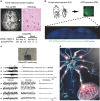Somatic mutations in disorders with disrupted brain connectivity
- PMID: 27282107
- PMCID: PMC4929695
- DOI: 10.1038/emm.2016.53
Somatic mutations in disorders with disrupted brain connectivity
Abstract
Mutations occur during cell division in all somatic lineages. Because neurogenesis persists throughout human life, somatic mutations in the brain arise during development and accumulate with the aging process. The human brain consists of 100 billion neurons that form an extraordinarily intricate network of connections to achieve higher level cognitive functions. Due to this network architecture, perturbed neuronal functions are rarely restricted to a focal area; instead, they are often spread via the neuronal network to affect other connected areas. Although somatic diversity is an evident feature of the brain, the extent to which somatic mutations affect the neuronal structure and function and their contribution to neurological disorders associated with disrupted brain connectivity remain largely unexplored. Notably, recent reports indicate that brain somatic mutations can indeed play a critical role that leads to the structural and functional abnormalities of the brain observed in several neurodevelopmental disorders. Here, I review the extent and significance of brain somatic mutations and provide my perspective regarding these mutations as potential molecular lesions underlying relatively common conditions with disrupted brain connectivity. Moreover, I discuss emerging technical platforms that will facilitate the detection of low-frequency somatic mutations and validate the biological functions of the identified mutations in the context of brain connectivity.
Figures


References
-
- Lupski JR. Genome mosaicism—one human, multiple genomes. Science 2013; 341: 358–359. - PubMed
-
- Biesecker LG, Spinner NB. A genomic view of mosaicism and human disease. Nat Rev Genet 2013; 14: 307–320. - PubMed
-
- Insel TR. Brain somatic mutations: the dark matter of psychiatric genetics? Mol Psychiatry 2014; 19: 156–158. - PubMed
Publication types
MeSH terms
LinkOut - more resources
Full Text Sources
Other Literature Sources
Medical

